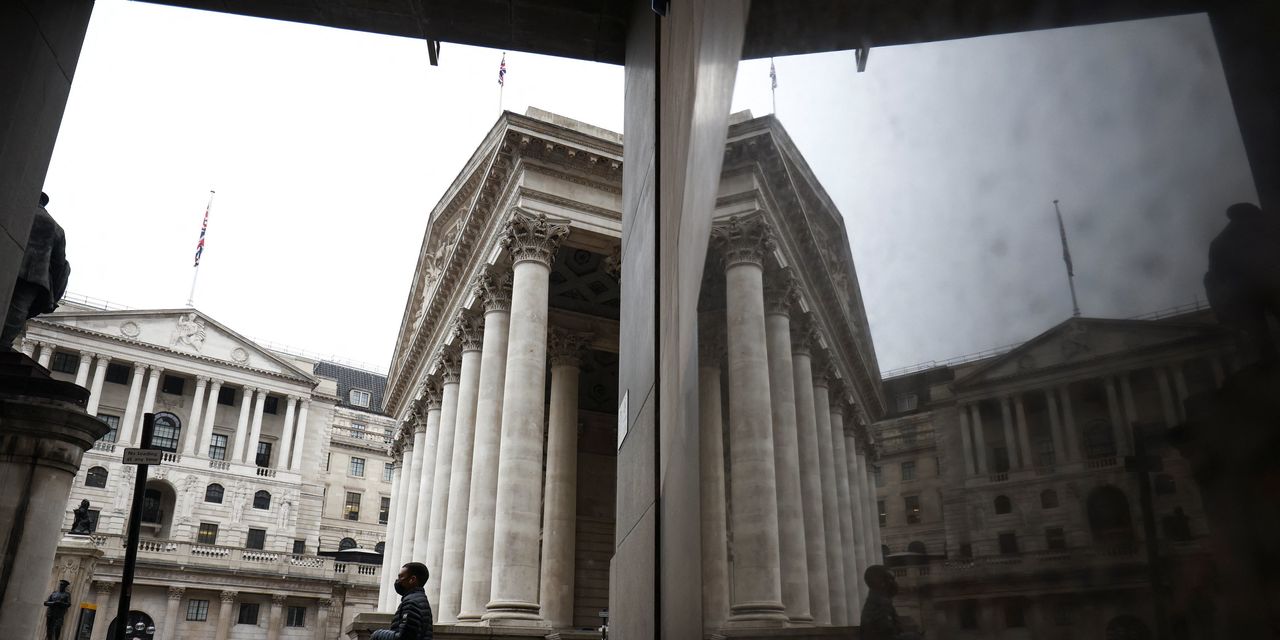
FRANKFURT—Europe’s central banks signaled growing concern about soaring inflation and a determination to quench it by raising interest rates, a policy shift that creates risks for investors and the world economy.
The hawkish moves in Europe reflect a growing appreciation among policy makers that inflation won’t come down as quickly as they had hoped. It echoes a similar shift in the U.S., where Federal Reserve Chairman Jerome Powell signaled last week that the U.S. central bank would begin steadily raising interest rates in mid-March.
The moves and signals from Europe’s central bankers Thursday rumbled through markets globally, with the euro strengthening more than 1% against the dollar, government bond markets selling off and stocks dropping on the prospect for tightening of policy in the months ahead.
The global economic rebound from the Covid-19 shock has been powerful but uneven, marked by sharp movements in demand underpinned by enormous fiscal and monetary stimulus, shortages of labor and materials and mounting inflation.
With economies now in recovery, concerns about inflation are coming to the fore. Central banks are weighing how to withdraw emergency policies introduced at the start of the pandemic without damping growth. Policy makers are attempting to thread a path between supporting the recovery without triggering a self-reinforcing price spiral.
“We face a trade-off between strong inflation and weakening growth,” Bank of England Gov. Andrew Bailey said.
The Bank of England raised its key interest rate for a second consecutive meeting, to 0.5%, saying it expected annual inflation to accelerate above 7% within months. It also said it would begin slowly reducing the size of its bondholdings. Four of nine members of the bank’s rate-setting committee wanted a bigger rise, to 0.75%, citing widening and more persistent price pressures than expected.
“We have not raised interest rates today because the economy is roaring away,” Mr. Bailey said at a news conference. He said officials were pushed to act because spiraling energy costs and surging goods prices risk fueling broader inflationary pressures in the British economy.
“An increase in bank rate is necessary because it is unlikely that inflation will return to target without it,” he said, referring to the BOE’s benchmark rate.
It was the first time the BOE has raised rates at consecutive meetings since 2004. That “suggests there is concern amongst policy makers about the possibility of inflation expectations becoming dis-anchored,” said Paul Hollingsworth, chief European economist at BNP Paribas Markets 360. “Once the inflation genie is out of the bottle, it’s quite hard to rebottle it.”
In Frankfurt, the European Central Bank kept its key interest rates unchanged, but at a news conference President Christine Lagarde left the door open to an interest-rate increase later this year, a turnabout from her position seven weeks ago.
Annual inflation in the eurozone rose to a record of 5.1% in January, more than double the ECB’s target, increasing pressure on the central bank to ditch its plans to keep rates on hold throughout the year. That compares with an inflation rate of 5.4% in the U.K. and 7% in the U.S. in December.
“The situation has indeed changed…Inflation is likely to remain elevated for longer than expected,” Ms. Lagarde said. She signaled that a policy shift might be unveiled as soon as the ECB’s next policy meeting on March 10.
Nonetheless, she stressed the difference between the U.S. and the eurozone. Eurozone demand “is pretty much back to where it was pre-Covid,” she said. “In the U.S., it is 30% up. Ask yourself why. Because of this massive fiscal stimulus that the U.S. economy has had, unlike the euro area where it has been more moderate, not excessive.”
European government bonds sold off during the ECB news conference. The moves were sharpest among those issued by southern European governments whose markets are considered to be more dependent on purchases by the ECB. The 10-year Italian sovereign bond yield climbed to 1.664% in the biggest rise since December 2020, while the equivalent German bund yield rose to 0.153%, the highest level since March 2019. The euro strengthened as much as 1.2% against the dollar after the monetary policy decision was released, before easing down moderately.
Konstantin Veit, portfolio manager at Pimco, said investors now expect the ECB to end its bond-buying program as early as April, and a first 0.1 percentage point rate rise in July. The ECB currently says it plans to continue its bond purchases at least through October.
In Europe, economic growth slowed sharply at the end of last year, and the recent surge in inflation largely reflects higher energy costs, analysts said. Unlike the U.S., where wages are soaring, negotiated wages in the eurozone increased 1.36% year-over-year in the third quarter, a record low since the euro was introduced in 1999, according to ECB data.
“The ECB is not the Fed, but today’s reality check and potential U-turn on 2022 rate hikes will leave its mark, starting with the peripheral [eurozone] bond market,” said Frederik Ducrozet, an economist with Pictet Wealth Management in Geneva.
Other central banks are moving in a similar direction.
In Brazil, the central bank on Wednesday increased its benchmark interest rate by 1.5 percentage points to 10.75% and signaled another increase at its next meeting. The Bank of Canada signaled last week it would soon start raising interest rates from record lows. Australia’s central bank this week ended its A$350 billion bond-buying program, equivalent to US$250 billion.
Japan remains a rare outlier. Bank of Japan Deputy Gov. Masazumi Wakatabe on Thursday denied speculation of early monetary tightening, saying the nation’s economy is just beginning to recover from the Covid-19 pandemic.
The comment came as some market participants and economists expect the Japanese central bank to follow the Fed. In its latest outlook report, the Bank of Japan’s policy board expects consumer prices to rise about 1% in the year ending March 2024.
Pressure on the ECB to raise rates has mounted in Germany, Europe’s largest economy, where price inflation has hovered around 5% for months, raising concerns about erosion of purchasing power in an inflation-averse population. House prices are also rising sharply, up about 12% year-over-year in the third quarter of 2021, in part because of ultralow interest rates.
—Anna Hirtenstein contributed to this article.
Write to Tom Fairless at [email protected], Isabel Coles at [email protected] and Jason Douglas at [email protected]
Corrections & Amplifications
The BOE said it would begin slowly reducing the size of its bond-buying program, the first time a major central bank has embarked on a sustained effort to shrink its balance sheet since the Fed attempted it in 2017. An earlier version of this article incorrectly said the BOE was the first major central bank to shrink its balance sheet. (Corrected on Feb. 3)
Copyright ©2022 Dow Jones & Company, Inc. All Rights Reserved. 87990cbe856818d5eddac44c7b1cdeb8








